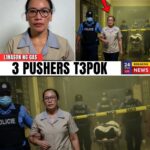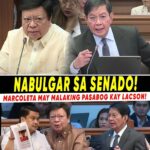Korina Sanchez Throws Shade at Mayor Vico Sotto Over Alleged Flood Control Anomalies

When respected broadcaster and veteran journalist Korina Sanchez speaks, the public listens. Known for her sharp tongue, uncompromising commentaries, and fearless pursuit of truth, she once again finds herself at the center of controversy. This time, her pointed remarks are directed at Pasig City’s beloved Mayor Vico Sotto, who has long enjoyed a reputation as a progressive, transparent, and uncorrupted public servant. But behind the glimmer of his clean image, Korina suggests that storm clouds are gathering—quite literally—around the city’s flood control projects.
The Context of Flood Control in Pasig
Pasig City has always battled with flooding. Being a low-lying urban area intersected by rivers and canals, heavy rains often spell disaster for residents. Successive governments have promised effective flood control solutions, yet year after year, waist-deep waters submerge barangays, leaving residents frustrated and distrustful of politicians’ pledges.
Mayor Vico Sotto, celebrated as a young reformer who broke the decades-long political dynasty in Pasig, came into office with a promise of genuine change. He has pushed for transparency, digitalization of government services, and people-centric governance. But it is precisely this shining reputation that Korina seems to challenge with her latest tirade.
Korina’s “Patama”

On her social media program and radio commentary, Korina did not mention Vico Sotto by name at first—but her words, according to many listeners, left no room for doubt. She criticized what she described as “grandiose but ineffective flood control projects” in Metro Manila, questioning how billions in taxpayer money could disappear while residents still wade through murky floodwaters.
She remarked: “You see these young politicians loved by the people, treated like rockstars. But at the end of the day, the question remains: where did the money go? Why are people still drowning in floods after all these expensive projects?”
The comment section exploded, with netizens quickly connecting the dots. Pasig City, after all, has been under scrutiny for its multimillion-peso flood control initiatives. Although Mayor Vico has prided himself on fighting corruption, Korina’s words suggested that something deeper may be brewing.
The Alleged Anomalies
Reports from independent watchdogs and local critics point to irregularities in procurement, questionable contractors, and possible overpricing in Pasig’s flood control projects. Allegations range from simple negligence in design to outright misuse of funds. Some observers claim that projects were awarded to companies with limited track records but deep political connections.
Korina highlighted these whispers without directly accusing Sotto of wrongdoing. Instead, she raised the larger question of accountability: “Even the most popular leaders must answer for failed projects. Transparency is not just about posting on Facebook; it’s about ensuring every peso reaches its rightful purpose.”
Her subtle but sharp “patama” struck a chord. After all, Vico Sotto has long been admired for his stand against corruption, but this issue puts him in a delicate position—balancing his image as a reformist with the hard realities of governance.
Public Reaction: A Divided Audience
The fallout was immediate. Some netizens applauded Korina for daring to speak against a popular figure, arguing that “untouchable” politicians need checks and balances. Others, however, accused her of seeking attention and targeting Sotto unfairly.
One comment read: “Korina is brave for pointing this out. Flooding in Pasig is still horrible despite millions spent. Where is the accountability?”
But defenders of the mayor countered: “Vico is doing his best. He inherited decades of corrupt practices. Korina should stop grandstanding and recognize his efforts.”
This online clash highlighted the enduring divide in Philippine politics—between those who demand immediate results and those who recognize the long, arduous process of systemic reform.
Political Implications
The timing of Korina’s remarks is significant. With whispers of national elections looming in the background, Mayor Vico Sotto is frequently floated as a future senator or even presidential candidate. Any dent in his reputation could carry long-term consequences.
Analysts suggest that Korina’s comments may not simply be about flood control. Rather, they could be part of a broader narrative to test Sotto’s resilience against criticism and to remind the public that “clean politics” is never as simple as it appears.
Some even speculate that other political players might be using Korina’s platform to plant seeds of doubt. Whether deliberate or coincidental, the effect is undeniable: the flood control issue is now tied to Sotto’s name, and he must address it head-on.
The Mayor’s Response
As of this writing, Mayor Vico Sotto has remained relatively quiet about Korina’s remarks. His office has continued to post updates about ongoing drainage and flood mitigation works, emphasizing technical details, completion percentages, and partnerships with national agencies.
In one statement, he insisted: “Flooding is not a problem that can be solved overnight. We are dealing with decades of poor planning, clogged waterways, and urban overpopulation. Our projects aim for long-term solutions, not quick fixes.”
This pragmatic tone reflects his usual approach—avoiding political drama and focusing on concrete governance. But critics argue that silence against Korina’s accusations could be perceived as weakness or evasion.
A Broader Debate on Governance
At its core, the controversy sparked by Korina’s comments raises deeper issues beyond Pasig City. Flooding is a perennial crisis across the Philippines, and billions are spent annually on drainage, dredging, and infrastructure. Yet many projects fail due to corruption, poor design, or lack of coordination.
Korina’s fiery commentary, whether targeted or general, resonates with a frustrated public tired of empty promises. Her words serve as a reminder that even popular leaders like Vico Sotto must be held accountable for results, not just rhetoric.
The Media Power of Korina Sanchez
It is also worth noting the unique influence Korina wields. With decades of experience in broadcast journalism and a reputation for bold opinions, she can shift public discourse with a few sentences. Politicians, no matter how popular, know that a single “patama” from her can ignite a national debate.
This controversy underscores the power of media personalities to challenge political narratives and force leaders to confront uncomfortable questions. In an age where social media amplifies every word, Korina’s sharp remarks ripple far beyond her immediate audience.
Conclusion: The Battle for Truth and Image
The clash between Korina Sanchez’s commentary and Mayor Vico Sotto’s governance highlights the fragile balance between perception and performance in politics. For Sotto, the challenge is to prove that his administration is not tainted by the same anomalies that plagued past leaders. For Korina, it is another testament to her role as a relentless critic, unafraid to take aim at even the most beloved figures.
As Pasig residents continue to wade through floodwaters, the debate rages on: is this merely a political storm, or the unveiling of a deeper truth about corruption and accountability?
What is certain is that Korina’s words have once again disrupted the narrative, forcing both supporters and critics of Mayor Vico Sotto to confront a pressing question: can even the “cleanest” politicians escape the mud when the floodwaters rise?






